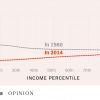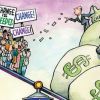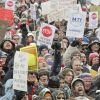-
 +28 +1
+28 +1The wealth gap in the US is worse than in Kenya
Kenya has been called an unsafe place for tourists because of frequent violent crimes. Former president Barack Obama said in a speech that it's time for the country to "change habits" because "too often here in Kenya … corruption is tolerated." But there is at least one thing the country gets better than the United States: Income equality.
-
 +29 +1
+29 +1Our Broken Economy, in One Simple Chart
Many Americans can’t remember anything other than an economy with skyrocketing inequality, in which living standards for most Americans are stagnating and the rich are pulling away. It feels inevitable. But it’s not.
-
 +15 +1
+15 +1End of coal: Failure to see it coming will hurt miners most
Donald Trump’s decision to pull the US out of the Paris Climate Agreement was sometimes presented as the president putting coal workers first. But the history of coal mining transitions, both in Europe and the US, tells us that failing to anticipate before change comes often finishes badly for workers.
-
 +15 +1
+15 +1Top 20 Percent Of Americans 'Hoard The American Dream'
There's a hidden force shaping our politics, says author Richard Reeves, a senior fellow at the Brookings Institution, and it's hidden in plain sight. In his forthcoming book, Dream Hoarders, Reeves argues that the top 20 percent of Americans — those with six-figure incomes and above — dominate the best schools, live in the best-located homes and pass on the best futures to their kids.
-
 +16 +1
+16 +1Cutting the Gordian Knot of Technological Unemployment with Unconditional Basic Income
Invisible Sheep, the Missing Right, and the Return of Common Wealth. In the opening of the film 2001: A Space Odyssey, viewers are shown a historic moment in time where primitive man used the first tool. It was a bone, and used like a club, it allowed a physically weaker group to overpower a physically stronger group.
-
 +5 +1
+5 +1To Fight Inequality, Tax Land
In the lasting debate over Thomas Piketty’s book on outsized returns on capital, a significant fact has been obscured: If you exclude land and housing, capital has not risen as a share of the U.S. economy. If you're surprised, you're not the only one. Intuition suggests this capital-output ratio should be higher today than it was in the early 1900s. Yet, in the U.S., capital excluding land and housing has been roughly constant as a share of the economy since the mid-1950s, and is lower today than at the turn of the 20th century.
-
 +36 +1
+36 +1Tax Cuts Don't Lead to Economic Growth, a New 65-Year Study Finds
Here's a brief economic history of the last quarter-century in taxes and growth. In 1990, President George H. W. Bush raised taxes, and GDP growth increased over the next five years. In 1993, President Bill Clinton raised the top marginal tax rate, and GDP growth increased over the next five years. In 2001 and 2003, President Bush cut taxes, and we faced a disappointing expansion followed by a Great Recession. Does this story prove that raising taxes helps GDP? No. Does it prove that cutting taxes hurts GDP? No.
-
 +29 +1
+29 +1In Unity is Strength
Trade unions have been demonized, demoralised and weakened by successive governments. In a time of immense economic inequality, Trade Union Congress leader, Frances O’Grady, is correct when saying “never has a strong, responsible trade union movement been so needed.” We live in an age of plentiful resources, yet these resources aren’t being shared, instead the super-rich are able to hoard wealth. In the past, unions metered this by bartering for higher wages and using their power to achieve change that benefited the working and middle class, such as equal pay, maternity pay, and health and safety laws.
-
 +23 +1
+23 +1Is the American Dream Really Dead?
Just a few decades ago, more than 90 percent of 30-year-olds earned more than their parents had earned at the same age. Now it’s only about 50 percent. What happened — and what can be done about it?
-
 +33 +1
+33 +1U.S. income inequality, on rise for decades, is now highest since 1928
President Obama took on a topic yesterday that most Americans don’t like to talk about much: inequality. There are a lot of ways to measure economic inequality (and we’ll be discussing more on Fact Tank), but one basic approach is to look at how much income flows to groups at different steps on the economic ladder. Emmanuel Saez, an economics professor at UC-Berkeley, has been doing just that for years. And according to his research, U.S. income inequality has been increasing steadily since the 1970s, and now has reached levels not seen since 1928.
-
 +24 +1
+24 +1Any way you calculate it, income inequality is getting worse
A flurry of new reports have provided yet more data demonstrating that inequality is getting worse. All right, this does not qualify as a shock. But it really isn’t your imagination. The economic crisis, nearly a decade on now, has been global in scope — working people most everywhere continue to suffer while the one percent are doing just fine. One measure of this is wages.
-
 +44 +1
+44 +1The Year in Housing: The Middle Class Can’t Afford to Live in Cities Anymore
Cities are increasingly populated by lower-income people in subsidized housing and high income people prepared to pay $3,500 a month for a one-bedroom.
-
 +43 +1
+43 +1Is Universal Basic Income a Good Idea? Stick Around, Because We're About to Find out
Upcoming UBI programs in Canada, Finland, Uganda, and other countries are very likely to tip the scales in the universal basic income debate one way or the other in 2017. Whether or not UBI is it, we need to find a solution to the problems that are inevitable as automation and AI replace human workers in the coming years.
-
 +25 +1
+25 +1Barely Half of 30-Year-Olds Earn More Than Their Parents
Barely half of 30-year-olds earn more than their parents did at a similar age, a research team found, an enormous decline from the early 1970s. Even rapid economic growth won’t do much to reverse the trend.
-
 +31 +1
+31 +1How to Kill the Middle Class
Strangling public-sector unions in Wisconsin has shrunk teachers’ pay and benefits. Who’s next?
-
 +27 +1
+27 +1A Job Is More Than a Paycheck
In the aftermath of the 2016 presidential election, I’m starting to rethink one of my basic beliefs about the economy. For a long time, I’ve believed that what mattered most for economic well-being was money. Median income, consumption, wages -- all the things I cared about most were measured in dollars. Because of this attitude, I’ve supported lots of policies aimed at boosting the amount of money in the average person’s pocket.
-
 +37 +1
+37 +1Democrats, Trump, and the Ongoing, Dangerous Refusal to Learn the Lesson of Brexit
The parallels between the U.K.’s shocking approval of the Brexit referendum in June and the U.S.’ even more shocking election of Donald Trump as president last night are overwhelming. Elites (outside of populist right-wing circles) aggressively unified across ideological lines in opposition to both. Supporters of Brexit and Trump were continually maligned by the dominant media...
-
 +22 +1
+22 +1The Demonisation of the Working-Class Shames Our Nation
Something very nasty is happening. A group of people, the most exploited within our society, are under attack. Their marginalisation has been going on for years. But it has accelerated disturbingly since 23 June. Few among the political class really understand them. These people live in modest homes in the grittier parts of the country. They work in factories, call centres and on building sites, often for low wages. They like football and watch Coronation Street. They sometimes hold old-fashioned views around things such as religion, family and nationhood. Some of them drive white vans.
-
 +21 +1
+21 +1The decline of the middle class is causing even more economic damage than we realized
I have just come across an International Monetary Fund working paper on income polarization in the United States that makes an important contribution to the secular stagnation debate. The authors — Ali Alichi, Kory Kantenga and Juan Solé — use standard econometric techniques to estimate the impact of declines in middle class incomes on total consumer spending. They find that polarization has reduced consumer spending by more than 3 percent or about $400 billion annually. If these findings stand up to scrutiny, they deserve to have a policy impact.
-
 +16 +1
+16 +1Middle class incomes had their fastest growth on record last year
Middle-class Americans and the poor enjoyed their best year of economic improvement in decades in 2015, the Census Bureau reported Tuesday, a spike that broke a years-long streak of disappointment for American workers but did not fully repair the damage inflicted by the Great Recession. Real median household income was $56,500 in 2015, the bureau reported, up from $53,700 in 2014. That 5.2 percent increase was the largest, in percentage terms, recorded by the bureau since it began tracking median income statistics in the 1960s.
Submit a link
Start a discussion




















